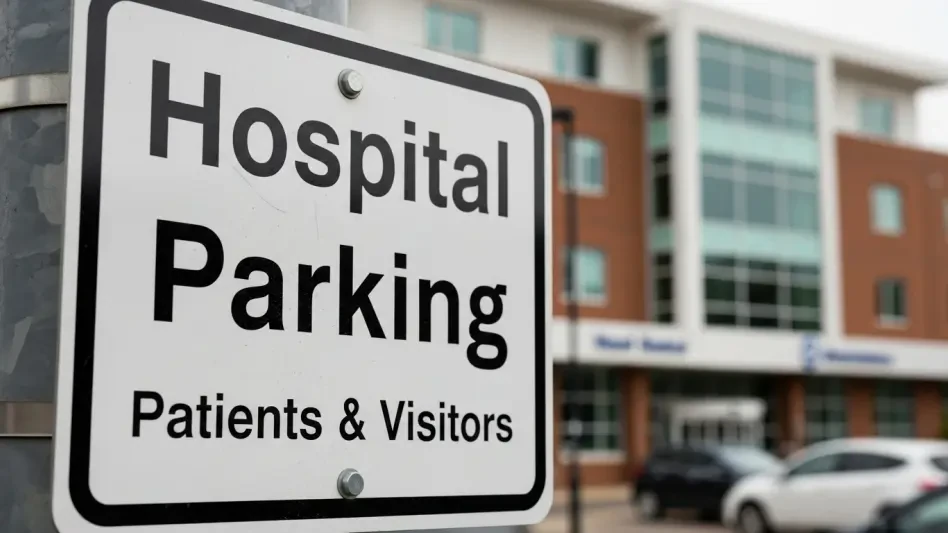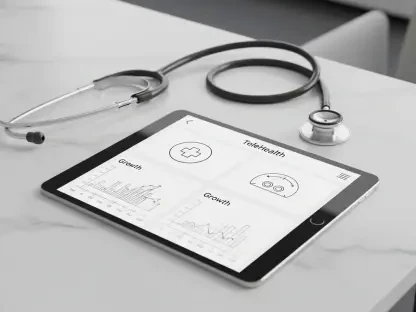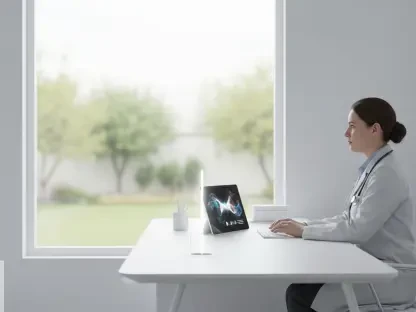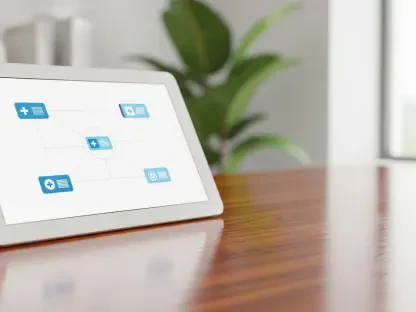Setting the Stage for a Better Healthcare Experience
In the bustling environment of a major urban hospital, a patient arrives for a critical appointment, already burdened by health concerns, only to circle the parking lot for 20 minutes in search of a spot, which can overshadow even the best medical care. This frustrating start often leaves a lasting negative impression, highlighting how parking, though considered a minor detail, plays a surprisingly pivotal role in shaping patient satisfaction within the healthcare industry. As hospitals strive to enhance every touchpoint of the patient journey, the ease of arrival emerges as a critical factor that can set the tone for the entire experience. This report delves into how smart parking solutions are addressing these challenges, transforming a logistical hurdle into a strategic asset for healthcare providers.
The healthcare sector today is increasingly focused on patient-centered care, where every interaction matters, from scheduling appointments to navigating facilities. Amid rising consumer expectations for seamless experiences, hospitals face pressure to improve not just clinical outcomes but also the peripheral aspects of service delivery. Parking, as the first point of contact for many patients and visitors, holds untapped potential to influence satisfaction metrics and overall perceptions of care. With key performance indicators like HCAHPS (Hospital Consumer Assessment of Healthcare Providers and Systems) scores tied to financial reimbursements, addressing parking woes is no longer optional but essential for institutional success.
The Role of Parking in Healthcare Experiences
Parking logistics might seem peripheral to medical care, yet they significantly impact how patients perceive their hospital visits. A smooth arrival can alleviate stress and create a positive first impression, while a frustrating search for a spot can heighten anxiety before a patient even steps through the door. This initial encounter often sets the emotional tone for subsequent interactions with staff and services, influencing overall satisfaction in ways that are frequently underestimated by administrators.
Beyond first impressions, parking challenges resonate through standardized evaluation tools such as HCAHPS and Press Ganey surveys, which measure patient experiences and directly affect hospital rankings and funding. These metrics capture feedback on non-clinical aspects, including ease of access, revealing how logistical issues can drag down scores even when clinical care is exemplary. Hospitals ignoring this connection risk undermining their broader efforts to deliver high-quality service.
This discussion fits into the larger framework of patient-centered care, which emphasizes holistic experiences over isolated medical outcomes. Peripheral elements like parking are integral to this approach, as they contribute to a sense of being valued and supported. Recognizing parking as a component of care delivery allows hospitals to address a critical pain point, aligning operational improvements with the goal of enhancing every facet of the patient journey.
Impact of Parking Challenges on Patients and Hospitals
Patient Stress and Emotional Well-Being
For patients, especially those grappling with urgent health issues or mobility limitations, finding parking can be a daunting task that compounds existing stress. Arriving at a hospital already fraught with worry about a diagnosis or procedure, only to face a crowded lot with no clear guidance, can push emotional strain to a breaking point. This added burden often leaves patients feeling frustrated before they even interact with medical staff, tainting their mindset for the visit.
The emotional toll extends beyond the moment of arrival, as prolonged searches for parking can lead to delays in appointments, further escalating tension. Patients may project this frustration onto their perceptions of care, rating their overall experience lower despite receiving competent treatment. Such negative feedback loops highlight how logistical barriers can overshadow clinical excellence, affecting trust in the healthcare provider.
Operational and Financial Repercussions for Hospitals
From an institutional perspective, parking frustrations directly correlate with diminished satisfaction scores on critical surveys like HCAHPS and Press Ganey. These metrics are not just indicators of patient sentiment but also influence hospital reputation and reimbursement rates from government and private payers. A consistent pattern of low scores due to access issues can signal deeper operational flaws to stakeholders, eroding confidence in the facility.
Financially, the stakes are high, as studies demonstrate that hospitals with “excellent” HCAHPS ratings achieve net margins of 4.7%, compared to just 1.8% for those with lower ratings. Poor parking experiences contribute to these disparities, costing hospitals valuable revenue through reduced reimbursements and patient retention. Addressing this often-overlooked area can yield significant returns by aligning logistical efficiency with financial health.
Moreover, a tarnished reputation stemming from accessibility complaints can deter potential patients from choosing a facility, especially in competitive markets. Negative word-of-mouth or online reviews citing parking woes can amplify the damage, pushing hospitals to prioritize solutions that mitigate these risks. The ripple effects of such challenges underscore the need for strategic interventions that tackle parking as a core component of service quality.
Overcoming Barriers with Smart Parking Solutions
Implementing modern parking systems in hospitals is not without hurdles, as costs and infrastructure constraints often pose significant challenges. Upgrading parking facilities with advanced technology requires substantial investment, which can strain budgets already allocated to clinical priorities. Additionally, older hospital campuses may lack the physical layout to easily accommodate new systems, complicating installation efforts.
Resistance to technological change among staff and administrators further impedes progress, as unfamiliarity with digital tools can slow adoption. To counter these obstacles, phased implementation plans can distribute costs over time, while partnerships with technology providers can offer expertise and support. Demonstrating return on investment through improved patient satisfaction scores also helps build a compelling case for such upgrades.
Tailoring solutions to specific hospital environments and patient demographics is equally vital for success. Rural facilities, for instance, may prioritize affordability over high-tech features, while urban centers might need robust systems to handle high traffic volumes. Customizing smart parking initiatives ensures they address unique needs, maximizing their impact on diverse populations and settings.
The Technology Behind Smart Parking: Automated Parking Guidance Systems
At the forefront of parking innovation are Automated Parking Guidance Systems (APGS), such as advanced solutions that employ smart-sensor technology and LED indicators to direct drivers to available spaces in real time. These systems monitor parking lots continuously, updating availability data to guide visitors efficiently, eliminating the guesswork of finding a spot. This seamless navigation transforms a common frustration into a streamlined process, particularly in busy hospital environments.
The benefits are measurable, with data showing a reduction in parking search times by up to 63%, a critical advantage for patients in pain or with mobility challenges. Such efficiency minimizes physical strain and emotional stress, allowing individuals to focus on their health rather than logistics. For those with urgent needs, the ability to park quickly can be a lifeline, directly enhancing their hospital experience.
Compliance with healthcare facility standards is another key feature, as these systems integrate smoothly with existing infrastructure for uninterrupted operation. Compatibility with security protocols and accessibility requirements ensures that APGS meet regulatory demands while improving access. This adaptability positions the technology as a practical solution for hospitals seeking to balance innovation with operational stability.
Future Prospects of Smart Parking in Healthcare
The healthcare industry is increasingly acknowledging parking as a vital touchpoint in delivering patient-centered care, with growing emphasis on addressing logistical pain points. This shift reflects a broader understanding that satisfaction hinges on the entire journey, not just treatment outcomes. As hospitals refine their focus on holistic experiences, parking solutions are gaining traction as essential components of service excellence.
Emerging trends point toward deeper integration of APGS with mobile applications, enabling pre-arrival parking reservations and real-time updates for patients. Such advancements align with broader smart hospital initiatives that leverage technology to enhance efficiency across operations. These innovations cater to rising consumer expectations for convenience, mirroring seamless experiences in other industries like retail and transportation.
Market disruptors, including rapid technology adoption in healthcare logistics, are poised to accelerate the spread of smart parking systems. Economic conditions and global healthcare trends, such as increased investment in digital infrastructure, further support this expansion. As patient demands evolve, hospitals adopting these solutions stand to gain a competitive edge, reinforcing their commitment to cutting-edge care delivery.
Reflecting on Insights and Charting the Path Forward
This exploration reveals that smart parking solutions significantly alleviate patient stress, elevate satisfaction metrics like HCAHPS scores, and bolster hospital performance across multiple dimensions. Real-world evidence, such as the 50% surge in patient satisfaction at UC Davis Medical Center following APGS implementation, underscores the tangible impact of these systems. The financial correlation, with higher satisfaction linked to improved net margins, further cements parking as a strategic priority for healthcare providers.
Looking ahead, hospitals are encouraged to view investment in smart parking not as a luxury but as a necessity for enhancing both individual experiences and institutional outcomes. Collaborating with technology providers to tailor solutions to specific needs emerges as a practical next step, ensuring scalability and relevance. Additionally, integrating parking systems with broader digital health platforms offers a pathway to future-proof operations against evolving patient expectations.
The journey to redefine healthcare experiences through logistical innovation suggests a transformative potential that extends beyond parking lots. By prioritizing such technologies, hospitals position themselves to build trust and loyalty among patients, securing a reputation for excellence in an increasingly competitive landscape. This strategic focus promises to reshape how care delivery is perceived, paving the way for sustained improvement in satisfaction and operational success.









